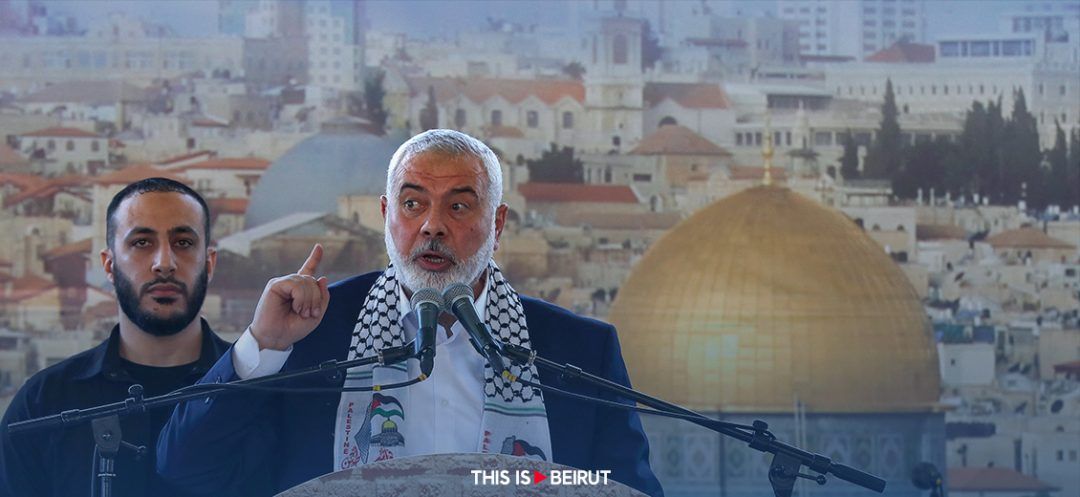- Home
- War in the Middle East
- Haniyeh Expected in Cairo Amid Ongoing Gaza Offensive

As violence persists in Gaza on the 118th day of the Israel-Hamas war, Hamas leader Ismail Haniyeh is due in Cairo on Thursday, February 1st, to discuss a proposed six-week truce.
The leader of Hamas is due in Cairo on Thursday for talks on a proposed truce in Gaza as Israel keeps up its offensive in the besieged Palestinian territory.
Hamas was reviewing a proposal for a six-week truce in its war with Israel, a source told AFP, after mediators gathered in Paris, with international efforts towards a new pause in the devastating war gathering pace.
In Gaza, there was no let-up in fighting or aerial bombardment, with the current focus of combat in the main southern city of Khan Younes, where Israel says leading Hamas militants are hiding.
Overnight, witnesses said several Israeli air strikes hit the city, while aid and health workers have for days reported heavy fighting, particularly around two hospitals.
According to the health ministry in Gaza, 119 people were killed in the latest night of strikes.
Israel has accused Hamas of operating from tunnels under hospitals in Gaza and of using medical facilities as command centers, a charge denied by the Islamist group, which is designated a "terrorist" organization by the European Union and the United States.
Due to constraints on the delivery of humanitarian aid, the population is "starving to death," the World Health Organization's emergencies director, Michael Ryan, said on Wednesday.
In its latest update, the UN reported heavy bombardment across the Gaza Strip, particularly in Khan Younes, while it said 184,000 Palestinians from the city were registered to receive humanitarian assistance after fleeing their homes.
As Qatari and Egyptian-led mediation efforts intensified, Hamas leader Ismail Haniyeh is due in Cairo on Thursday to discuss a truce proposal thrashed out in Paris last weekend with CIA chief William Burns.
A Hamas source told AFP the three-stage plan would start with an initial six-week halt to the fighting that would see more aid deliveries into the Gaza Strip.
Only "women, children, and sick men over 60" held by Gaza militants would be freed during that stage in exchange for Palestinian prisoners in Israel, the source said, requesting anonymity due to the sensitivity of the talks.
There would also be "negotiations around the withdrawal of Israeli forces," with possible additional phases involving more hostage-prisoner exchanges, said the source, adding that the territory's rebuilding was also among the issues addressed by the deal.
The war was triggered by Hamas' October 7 attack on Israel, which resulted in the deaths of around 1,140 people, mostly civilians, according to an AFP tally based on official figures.
Following the deadliest attack in Israel's history, its military launched a withering air, land, and sea offensive that has killed at least 26,900 people in Gaza, most of them women and children, according to the health ministry in Gaza.
Tens of billions of dollars and seven decades would be required to rebuild Gaza, which "currently is uninhabitable" as half its structures are damaged or destroyed, the UN Conference on Trade and Development said.
Israeli Prime Minister Benjamin Netanyahu has ruled out pulling forces from Gaza and repeatedly vowed to destroy Hamas in response to the October attack.
Netanyahu has also opposed releasing "thousands" of Palestinian prisoners as part of any deal, though his office on Sunday called the ongoing negotiations "constructive."
With the families of scores of Israeli hostages still trapped in Gaza, not knowing when their loved ones will return home, there has been mounting criticism of Netanyahu's government, sparking protests and even calls for early elections.
Militants seized about 250 hostages. Israel says 132 of them remain in Gaza, including at least 29 people believed to have been killed.
For people in Gaza, access to humanitarian aid has been further hampered by a major controversy surrounding the UN's agency for Palestinian refugees, UNRWA, after Israel accused several of its staff members of involvement in the Hamas attack.
The claims last week saw several donor countries, led by key Israel ally the United States, freeze funding for the agency.
United Nations Secretary-General António Guterres told a UN committee he had "met with donors to listen to their concerns and to outline the steps we are taking".
UNRWA spokeswoman Tamara Alrifai told AFP the agency supports "an independent investigation" into the Israeli claims that led to the funding crisis.
Netanyahu told a meeting of UN ambassadors in Jerusalem that UNRWA had been "totally infiltrated" by Hamas. He said other agencies should replace it.
Adel Zaanoun and Beatrice Le Bohec, with AFP
The leader of Hamas is due in Cairo on Thursday for talks on a proposed truce in Gaza as Israel keeps up its offensive in the besieged Palestinian territory.
Hamas was reviewing a proposal for a six-week truce in its war with Israel, a source told AFP, after mediators gathered in Paris, with international efforts towards a new pause in the devastating war gathering pace.
In Gaza, there was no let-up in fighting or aerial bombardment, with the current focus of combat in the main southern city of Khan Younes, where Israel says leading Hamas militants are hiding.
Overnight, witnesses said several Israeli air strikes hit the city, while aid and health workers have for days reported heavy fighting, particularly around two hospitals.
According to the health ministry in Gaza, 119 people were killed in the latest night of strikes.
Israel has accused Hamas of operating from tunnels under hospitals in Gaza and of using medical facilities as command centers, a charge denied by the Islamist group, which is designated a "terrorist" organization by the European Union and the United States.
Due to constraints on the delivery of humanitarian aid, the population is "starving to death," the World Health Organization's emergencies director, Michael Ryan, said on Wednesday.
In its latest update, the UN reported heavy bombardment across the Gaza Strip, particularly in Khan Younes, while it said 184,000 Palestinians from the city were registered to receive humanitarian assistance after fleeing their homes.
Three-Stage Plan
As Qatari and Egyptian-led mediation efforts intensified, Hamas leader Ismail Haniyeh is due in Cairo on Thursday to discuss a truce proposal thrashed out in Paris last weekend with CIA chief William Burns.
A Hamas source told AFP the three-stage plan would start with an initial six-week halt to the fighting that would see more aid deliveries into the Gaza Strip.
Only "women, children, and sick men over 60" held by Gaza militants would be freed during that stage in exchange for Palestinian prisoners in Israel, the source said, requesting anonymity due to the sensitivity of the talks.
There would also be "negotiations around the withdrawal of Israeli forces," with possible additional phases involving more hostage-prisoner exchanges, said the source, adding that the territory's rebuilding was also among the issues addressed by the deal.
The war was triggered by Hamas' October 7 attack on Israel, which resulted in the deaths of around 1,140 people, mostly civilians, according to an AFP tally based on official figures.
Following the deadliest attack in Israel's history, its military launched a withering air, land, and sea offensive that has killed at least 26,900 people in Gaza, most of them women and children, according to the health ministry in Gaza.
Tens of billions of dollars and seven decades would be required to rebuild Gaza, which "currently is uninhabitable" as half its structures are damaged or destroyed, the UN Conference on Trade and Development said.
Aid Access
Israeli Prime Minister Benjamin Netanyahu has ruled out pulling forces from Gaza and repeatedly vowed to destroy Hamas in response to the October attack.
Netanyahu has also opposed releasing "thousands" of Palestinian prisoners as part of any deal, though his office on Sunday called the ongoing negotiations "constructive."
With the families of scores of Israeli hostages still trapped in Gaza, not knowing when their loved ones will return home, there has been mounting criticism of Netanyahu's government, sparking protests and even calls for early elections.
Militants seized about 250 hostages. Israel says 132 of them remain in Gaza, including at least 29 people believed to have been killed.
For people in Gaza, access to humanitarian aid has been further hampered by a major controversy surrounding the UN's agency for Palestinian refugees, UNRWA, after Israel accused several of its staff members of involvement in the Hamas attack.
The claims last week saw several donor countries, led by key Israel ally the United States, freeze funding for the agency.
United Nations Secretary-General António Guterres told a UN committee he had "met with donors to listen to their concerns and to outline the steps we are taking".
UNRWA spokeswoman Tamara Alrifai told AFP the agency supports "an independent investigation" into the Israeli claims that led to the funding crisis.
Netanyahu told a meeting of UN ambassadors in Jerusalem that UNRWA had been "totally infiltrated" by Hamas. He said other agencies should replace it.
Adel Zaanoun and Beatrice Le Bohec, with AFP
Read more



Comments